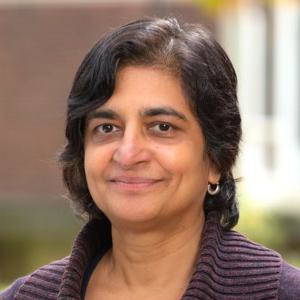
Banu Subramaniam
Luella LaMer Professor of Women’s and Gender Studies
Feminist Science and Technology Studies, Environmental Studies, Evolutionary Biology, Plant Sciences, Postcolonial Science Studies, South Asian Studies, Religion and Science; Anti-colonial and Decolonial Approaches to Science.
I am excited to join the faculty of WGST. I am an interdisciplinary scholar, trained as an evolutionary biologist and plant scientist, and have since embraced tools from the humanities and social sciences to help shape the field of Feminist Science and Technology Studies. I explore the philosophy, history, and culture of the natural sciences and medicine as they relate to gender, race, ethnicity, and caste. My recent research rethinks the field and practice of botany in relation to histories of colonialism and xenophobia and explores the wide travels of scientific theories, ideas, and concepts as they relate to migration and invasive species. I also continue to work on the relationship of science and Hindu Nationalism in India.
I am the author of three books. These include Botany of Empire: Plant Worlds and the Scientific Legacies of Colonialism (University of Washington Press, 2024). Holy Science: The Biopolitics of Hindu Nationalism (University of Washington Press, 2019) won the 2020 Michelle Kendrick Memorial Book Prize from the Society for Literature, Science & the Arts. The book focuses on how science and religion have become interwoven in emergent nationalist politics and novel conceptions of modernity in India. The book weaves together techno-poetic myths and storytelling with imminent critique of scientific discourses to undo rigid notions of identity and belonging. Ghost Stories for Darwin: The Science of Variation and the Politics of Diversity (University of Illinois Press, 2014), was winner of the Ludwik Fleck Prize 2016 for an outstanding book across the breadth of science and technology studies. I am co-editor of Feminist Science Studies: A New Generation (Routledge, 2001) that put Feminist Science Studies on the map, and MEAT! A Transnational Analysis which looks at human/animal/plant relations and at the production and consumption of meat (and its alternatives) from the vantage of a wide range of interdisciplinary scholars working at the intersections of the sciences and the humanities.
Selected recent articles and essays
- “Translations in Green: Colonialism, Postcolonialism, and the Vegetal Turn,” Configurations 32, #1, 2024 (with Sushmita Chatterjee)
- “Roots of Coincidence: The Racial Politics of COVID-19” for Ordering the Human: Global Science and Racial Reason, ed. Dorothy Roberts, Natalie Shibley, Eram Alam. Columbia University Press. 2024.
- Wither Queer Biology? Los Angeles Review of Books, November 2023:
- “Re-imagining Reproduction: The Queer Possibilities of Plants” Integrative and Comparative Biology, Volume 63, Issue 4, October 2023, 946-959.
- “Gender and the Coloniality of Science,” Seminar #760, December 2022.
- “Methodologies of the Pressed: Cartographies for Adisciplinary Sciences,” Science, Technology and Society, Volume 28, Issue 1, 2022.
- “The Power and Perils of De Novo Domestication Using Genome Editing,” (with Madelaine Bartlett, Brook Moyers, Jarett Man and Nokwanda Makunga) Annual Review of Plant Biology 74 (2023): 727-550
Courses recently taught at Wellesley
- ES/WGS 238: Naturecultures: Feminist Futures & Environmental Justice
- WGS 120: Introduction to Women’s and Gender Studies
- ANTH/WGST 254: Biology of Human Difference
- SOC/WGST 256: Global Feminisms
Education
- B.S., University of Madras
- Ph.D., Duke University